Bliss
The area of Newtown Creek in extreme western Queens and the surrounding
communities were once the one of busiest waterways in the world.
Various dock railways including the Brooklyn East District Terminal, as
well as the Long Island Railroad and the Pennsylvania Railroad all had terminals
and car floats in the area.
Neziah Bliss was an early citizen and founder in the area. In 1839 he opened the Ravenswood, Greenpoint and
Hallett's Cove turnpike, the first paved road from village of Greenpoint in
Brooklyn County to what would become Long Island City (in 1872) and
Astoria. In 1837 he was a partner in a development called
Blissville in what is now Long Island City.
Not much of the original Blissville survives, much has happened
since
Blissville's appearance in 1837. Later, most of the Long Island RR car floats and railroad
yards were built in this area.
The first photo is of the Bliss tower (?) looking north, to the right
is a grade crossing, but the road ends about 20 feet south at Newtown Creek
Side, above this street is the Greenpoint Avenue Bridge, to the left the LIRR's
Long Island City yards where the car floats used to be, and the route to Long Island City depot and the Montauk
Cut-Off. Bliss controls this junction, however freight is sparse
through here.
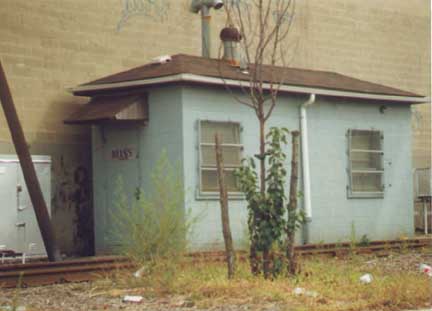
Neziah Bliss built the first bridge in this part of Brooklyn. The
bridge, over Bushwick
Creek, connected Williamsburgh (eventually a city for a while later in the 19th century) and
Greenpoint. The creek is now Bushwick Inlet, the site of the next
photo. The inlet has
ended at this former bridge site for over a century.
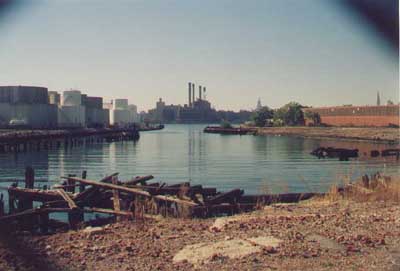
But before Bushwick Creek was truncated (it was a fetid tidal estuary very
soon after Williamsburgh became a more populated suburb after the Civil War)
it saw a big shipyard just to the north (right) of this view. At this
boatyard, the ironclad Monitor was conceived, built and launched.
The Monitor class ironclads are credited with the successful blockades of southern ports, mostly through fear, as the British did not challenge
them, nor did the Confederate State Army after the Merrimack failed at the
task.
Greenpoint was known as the "Birmingham of Brooklyn, of America,"
after the English port city with similar varied industry. Industries
included shipping, ship building and ropemaking. It was the purveyor of the "Five Black
Arts": Glass Making, Iron Working, Printing, Oil and Gas Refining and Pottery manufacturing (the term "China" for porcelain originated in
Greenpoint).
A decade after the Monitor was launched near this site, Austin Corbin opened
the narrow gauge New York and Manhattan Beach Railroad in 1873.
Ferries left 23rd Street in Manhattan (New York City) for Quay Street, to the right
of the second photo, where they boarded trains for Manhattan Beach Station.
Passenger trains left for Manhattan Beach and Corbin's hotel, the snobby alternative to Culver's hotel in Brighton Beach (served by Culver's Prospect
Park and Coney Island RR) and on to Bay Ridge. The plan was to build east and compete with the Long Island RR and South
Side RR, but the line, though approved and graded in places east, never got further east than New Lots in
Brooklyn.
The Manhattan Beach RR is the only one of the 5 steam lines to Coney Island that
did not become a subway line. Passengers could go to Manhattan Beach until
1924, and to Bay Ridge until 1897, but after Corbin bought the LIRR in 1883,
the Greenpoint terminus soon became part of history. It was standard gauged, shuttle service to Cooper Junction lasted until
1885, when passenger service out of Greenpoint and the ferry service ended.
Freight service on what was post-1883 called the Greenpoint Division lasted
until 1896 after which railroads were never again seen in Greenpoint
The line below Bushwick had passenger service until 1894 (a shuttle Bushwick
to Evergreen Junction) and as the Evergreen Branch it carried freight until
its 1938 abandonment. This is looking northwest on the former right of way
looking northwest on Bleecker Street. The railroad ran midblock from Evergreen to Johnson
Yards/Bushwick Jct. 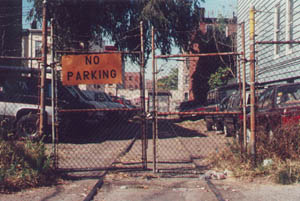 This is now Ridgewood but Bushwick is just to the left
(in the 1920's part of Ridgewood opted to be in Queens rather than
Bushwick).
This is now Ridgewood but Bushwick is just to the left
(in the 1920's part of Ridgewood opted to be in Queens rather than
Bushwick).
This is practically the only remainder of this midblock surface
railroad - possibly just one track since the merger into the Long Island
RR and change from narrow gauge, definitely one track by the time of
abandonment. It ran past many many neighborhood streets and was no doubt quite unpopular with residents and hindered auto traffic-the
LIRR abandoned this line rather than redo it with grade eliminations
In 1904 summer service was tried on the Bay Ridge line,
and it was part of the NY Connecting RR (and the NY,NH&H). Today
it sees a few LIRR trains and also carries the South Brooklyn RR, the subway
freight line descendent of the Culver line which abandoned most of its route
in the 1980's.
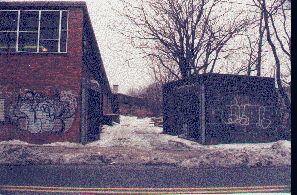 Here we approach the turn into Evergreen Junction. The first time a train came down this narrow gauge ROW was in 1878 as the Glendale and East River RR portion of the
NY&MB. To the right the line veered south to go to Bay Ridge
(NY, Bay Ridge & Jamaica RR branch) or Manhattan Beach.
Here we approach the turn into Evergreen Junction. The first time a train came down this narrow gauge ROW was in 1878 as the Glendale and East River RR portion of the
NY&MB. To the right the line veered south to go to Bay Ridge
(NY, Bay Ridge & Jamaica RR branch) or Manhattan Beach.
After the 1883 merger this became Cooper Junction, (this route only connecting to the south), and the LIRR rerouted through
trains from Long Island City using the new cut-off to the north that connected with the Montauk Division, bypassing this route. A
shuttle ran from Greenpoint to Cooper Junction to 1885, and from Bushwick to here until
1894...freight on the Greenpoint Division until 1896.
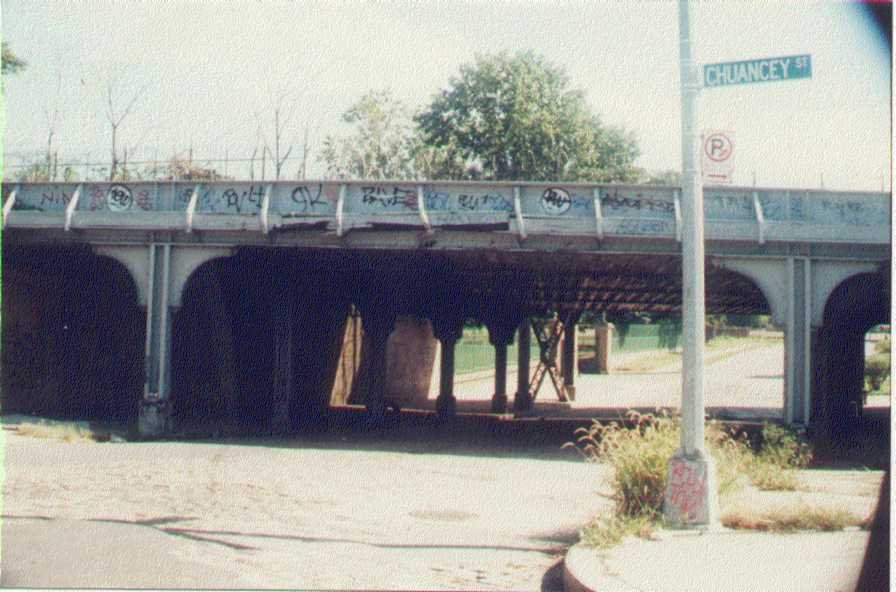 After completion of the NY Connecting RR this became Evergreen Junction, the actual junction a couple blocks
south near the
overpass pictured here. Freight rumbled through Bushwick/Ridgwood
midblock until abandonment in 1938.
After completion of the NY Connecting RR this became Evergreen Junction, the actual junction a couple blocks
south near the
overpass pictured here. Freight rumbled through Bushwick/Ridgwood
midblock until abandonment in 1938.